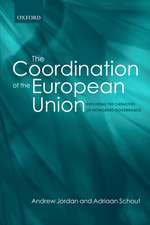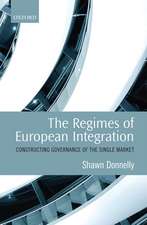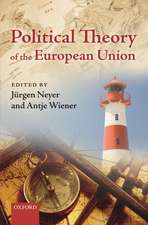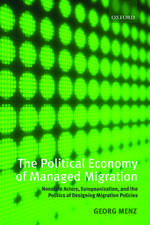Voting Unity of National Parties in Bicameral EU Decision-Making: Speaking with One Voice?
Autor Monika Mühlböcken Limba Engleză Hardback – 19 dec 2016
| Toate formatele și edițiile | Preț | Express |
|---|---|---|
| Paperback (1) | 382.57 lei 6-8 săpt. | |
| Springer International Publishing – 7 iul 2018 | 382.57 lei 6-8 săpt. | |
| Hardback (1) | 389.70 lei 6-8 săpt. | |
| Springer International Publishing – 19 dec 2016 | 389.70 lei 6-8 săpt. |
Preț: 389.70 lei
Nou
Puncte Express: 585
Preț estimativ în valută:
74.59€ • 77.58$ • 62.51£
74.59€ • 77.58$ • 62.51£
Carte tipărită la comandă
Livrare economică 13-27 martie
Preluare comenzi: 021 569.72.76
Specificații
ISBN-13: 9783319394640
ISBN-10: 3319394649
Pagini: 245
Ilustrații: XIV, 220 p. 10 illus.
Dimensiuni: 148 x 210 x 18 mm
Greutate: 0.45 kg
Ediția:1st ed. 2017
Editura: Springer International Publishing
Colecția Palgrave Macmillan
Locul publicării:Cham, Switzerland
ISBN-10: 3319394649
Pagini: 245
Ilustrații: XIV, 220 p. 10 illus.
Dimensiuni: 148 x 210 x 18 mm
Greutate: 0.45 kg
Ediția:1st ed. 2017
Editura: Springer International Publishing
Colecția Palgrave Macmillan
Locul publicării:Cham, Switzerland
Cuprins
Chapter 1 Introduction.- Chapter 2 Of Principals, Agents, and Constraints.- Chapter 3 Methods and Data.- Chapter 4 How do National Parties Try to Influence Voting Behavior in Council and EP?.- Chapter 5 How do Institutional Constraints Shape Voting Bahavior in Bicameral EU Decision-Making?.- Chapter 6 Voting Unity between Ministers and MEPS of the Same National Party.- Chapter 7 Are National Parties Able to Ensure Cohesive Voting Behavior of their Representatives in the EU?.- Chapter 8 Conclusion.
Notă biografică
Monika Mühlböck is Postdoctoral Researcher in the Department of Economic Sociology at the University of Vienna, Austria. She has previously worked at the University of Salzburg, the Vienna University of Economics and Business and the University of Mannheim. Her research focuses on the European Union and legislative behavior.
Textul de pe ultima copertă
This book provides a detailed study into whether Ministers in the Council vote the same way as Members of the European Parliament if they are from the same national party. The author explores the voting behavior of national representatives at the EU level, and this analysis is combined with insights from interviews with practitioners to shed light on the influence of national parties in the legislative process of the EU. This influence is found to be limited, as ministers in the Council and Members of the European Parliament submit to the constraints in their respective institutions rather than strictly voting along party lines. The study enhances our knowledge not only with regard to the role of national parties at the EU level, but also concerning the inter- and intra-institutional decision-making processes in the European Union. This book will particularly be of use to scholars and upper-level students interested in EU studies, legislative behaviour, and party politics.
Caracteristici
Provides an in-depth analysis of the mechanisms available to national parties to attempt control over their representatives’ behaviour in the EP and Council Offers an important contribution to our understanding of EU legislative politics Opens up new avenues for research on national party coordination between the Council and EP, which is an under-researched area













